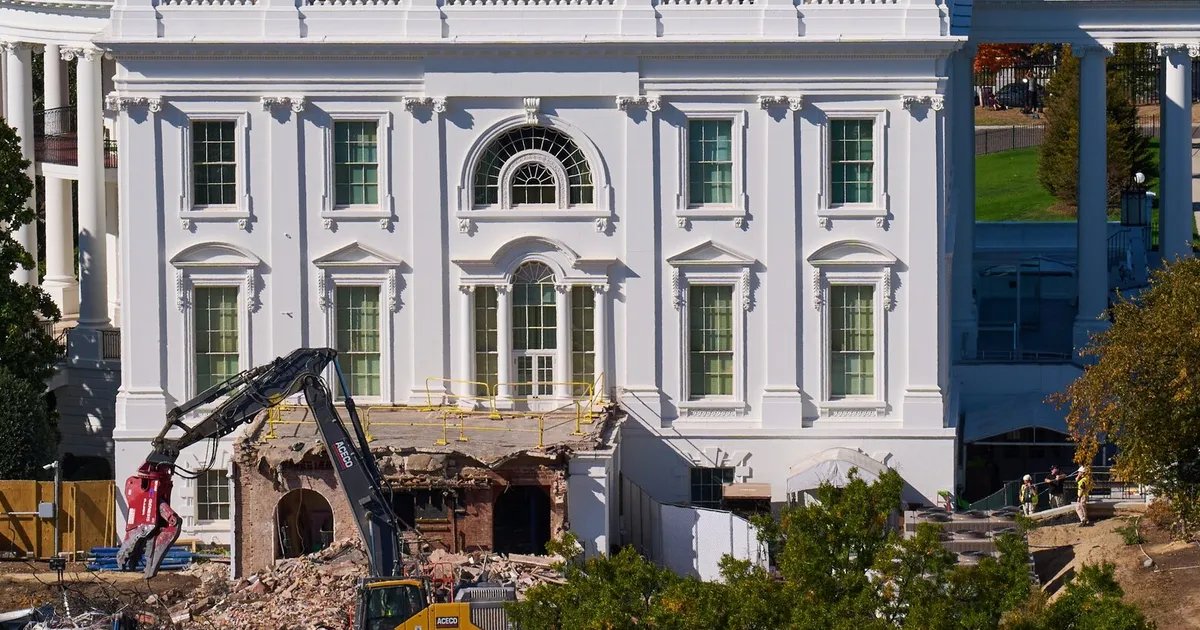Amazon, Microsoft and T-Mobile, all headquartered in the Seattle area, have donated to President Donald Trump’s new ballroom at the White House, according to a list of donors.
The list, shared by The White House on Thursday, has around 40 donors, including companies, foundations and individuals. It doesn’t include the amounts of their contributions to the construction of Trump’s ballroom, which is projected to cost $300 million.
Trump’s White House alteration centers on building a ballroom in the East Wing. Construction, which includes demolishing part of the historic building, began this week after an initial announcement in July.
The renovation is expected to finish before Trump’s second term wraps in January 2029.
Redmond-based Microsoft said Thursday that the renovation is not only an asset for Trump’s presidency but also for future U.S. leaders.
“This project will benefit not only this presidency, but presidencies to come, as they welcome guests to the White House on behalf of the American people,” a Microsoft spokesperson said in a statement. “We contributed to this effort on October 1st to update a home built more than 200 years ago so that it can meet 21st century needs.”
T-Mobile, whose headquarters is in Bellevue, said its contribution is part of a larger donation.
“Ahead of America’s 250th Anniversary, T-Mobile donated to the Trust for the National Mall, which partners with the National Park Service to restore and enrich the historic landmarks that define our nation’s capital, such as the White House ballroom,” a company spokesperson said in a statement.
“T-Mobile has no role in the use of those funds or decisions related to the construction of the ballroom.”
Microsoft and T-Mobile didn’t specify how much they donated to the ballroom construction.
Seattle-based Amazon didn’t respond to a request for comment.
The ballroom construction has sparked criticism, spanning its funding, timing and necessity.
Among the opponents of the move is the National Trust for Historic Preservation, which pushed several federal government offices to pause the project until public review processes take place. The nonprofit organization cited concerns about threats to the proper preservation of the historic building.
“We are deeply concerned that the massing and height of the proposed new construction will overwhelm the White House itself—it is 55,000 square feet—and may also permanently disrupt the carefully balanced classical design of the White House with its two smaller, and lower, East and West Wings,” president and CEO Carol Quillen said in a statement on Tuesday.
The decision to kick off construction also comes during a government shutdown, which hit its 23rd day Thursday. While lawmakers attempt to reach a compromise on federal funding, many government employees are either furloughed or carrying out their work duties without pay.
The White House dismissed criticism as “the latest instance of manufactured outrage” in a Tuesday news release. Spokespeople pointed to past presidential renovations as justification for Trump’s project, which is said to be privately funded, including by Trump personally.
Other notable renovations since White House construction began in 1792 include former President Theodore Roosevelt’s West Wing addition in 1902 and former President Harry Truman’s four-year interior redesign, which wrapped in 1952, according to the White House Historical Association.
The White House said it’s unable to host major events in the building. It estimates that the ballroom will span 90,000 square feet, with a seating capacity of 650 people — more than triple what the East Room can host at 200 people.
This month, Trump hosted around 130 donors, supporters and corporate representatives — Amazon, Microsoft and T-Mobile among them — for a dinner at the White House to celebrate their contributions.
The three Seattle-area companies have previously put sizable donations toward Trump’s initiatives. Amazon and Microsoft each donated $1 million to the Trump Vance Inaugural Committee, according to a Seattle Times investigation published earlier this year.
Other major names on the ballroom construction donor list include Apple, Google, HP, Lockheed Martin and Meta.
Apple, headquartered in Cupertino, Calif., decided to expand in Seattle earlier this year after signing an office lease in South Lake Union, in addition to another downtown location.
Google has an office in South Lake Union and two more in Kirkland. Palantir Technologies, a Denver-based software company, also has an office in South Lake Union.
Based in Menlo Park, Calif., Meta has reduced its presence in the Seattle area, though it still has corporate locations in Seattle, Bellevue and Redmond.
Two donors, Cameron and Tyler Winklevoss, lead Gemini, a New York City-based cryptocurrency platform with an office in Bellevue.
The donor list includes:
- Altria Group
- Amazon
- Apple
- Booz Allen Hamilton
- Caterpillar
- Coinbase
- Comcast
- J. Pepe and Emilia Fanjul
- Hard Rock International
- HP
- Lockheed Martin
- Meta Platforms
- Micron Technology
- Microsoft
- NextEra Energy
- Palantir Technologies
- Ripple
- Reynolds American
- T-Mobile
- Tether America
- Union Pacific Railroad
- Adelson Family Foundation
- Stefan E. Brodie
- Betty Wold Johnson Foundation
- Charles and Marissa Cascarilla
- Edward and Shari Glazer
- Harold Hamm
- Benjamin Leon Jr.
- The Lutnick Family
- The Laura & Isaac Perlmutter Foundation
- Stephen A. Schwarzmann
- Konstantin Sokolov
- Kelly Loeffler and Jeff Sprecher
- Paolo Tiramani
- Cameron Winklevoss
- Tyler Winklevoss


Leave a Reply